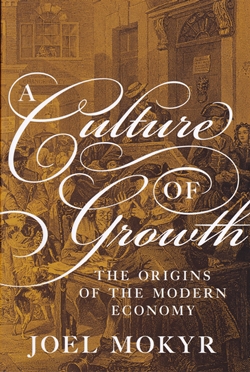 Cultural, scientific and economic historians love to mull over a central question in the development of the modern world order. Just why did the Industrial Revolution begin at the time and place it did, and so initiated the phenomenon known to their tribe as the 'Great Divergencce' or 'Great Enrichment'? Suddenly, after millennia of economic stasis, Europe, and thereafter much of the world, became immeasurably richer than ever before.
Cultural, scientific and economic historians love to mull over a central question in the development of the modern world order. Just why did the Industrial Revolution begin at the time and place it did, and so initiated the phenomenon known to their tribe as the 'Great Divergencce' or 'Great Enrichment'? Suddenly, after millennia of economic stasis, Europe, and thereafter much of the world, became immeasurably richer than ever before.
Was it the growth of a Baconian science? Was it communications? Was it Europe's many fractious political units vying with one another? Was it a simple and novel faith in progress, and if so, where did that come from? And why had it not arisen before, notably in China - the famous 'Needham Question'?
Undoubtedly the problem with this problem is that it is too big; there is too much evidence, too much complexity. A specialist will see just one facet of it, suggest a partial explanation, and be content. But the bigger picture would be only partially illuminated by, for example, a geologist, explaining that any 'Great Enrichment' must ultimately derive from more efficient mining, because farming has energetic limits and only mining can create the surplus above subsistence upon which all great wealth is ultimately based. It's not wrong, and I wish more people understood it. But it is, for all that, partial. The answers we crave lie in the sociological 'why' beyond the 'how'.
It is not often that a book leaves me gasping in admiration for the breadth and depth of an author's reading and knowledge, but this one did. Based on the prestigious Graz Schumpeter Lectures delivered in 2010, economic historian Joel Mokyr (Northwestern University) commands a stupefyingly broad range of literature in world social and economic history, history of science and technology, and philosophy. His scientific analogies make it clear that he is no slouch in that department either.
In almost 400 typographically dense, but lucid, readable pages, Mokyr concludes that what we call 'progress' took off in Europe at the end of the 18th Century as a result of what he calls the 'culture of growth', which itself grew from seeds planted in the early Middle Ages. These ideas set value on accurate knowledge of the world, and the belief that such 'useful knowledge' not only could, but should be put to work for 'the betterment of Man's estate', as Francis Bacon put it.
If you want to understand the contingent conditions and events that invented these ideas, so central to us today that we (wrongly) assume people have always had them, this is it. Mokyr's concluding chapters, essaying a convincing answer Joseph Needham's great question, are surely essential reading, now that China is beginning - after her eye-blink 400-year eclipse - to resume her historical place as the world's leading civilization. A book to be read and pondered - and savoured - slowly. A magnificent achievement.
Reviewed by Ted Nield
A CULTURE OF GROWTH: THE ORIGINS OF THE MODERN ECONOMY by JOEL MOKYR. 2017 Princeton University Press. ISBN: 9780691168883 (hbk) 403pp List Price: £24.99